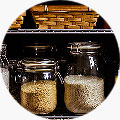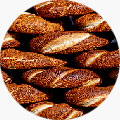Pastirma: A Timeless Treasure of Turkish Cuisine
What is Pastirma?
Pastirma is a traditional Turkish cured meat made from beef. It is air-dried and coated in a mixture of spices, including cumin, coriander, fenugreek, and black pepper. Pastirma has a unique flavor that is both salty and savory, with a slightly sweet aftertaste. It has a firm texture and can be sliced thinly or diced.
History of Pastirma
The history of pastirma dates back to the pre-Ottoman era. It is believed to have originated in the Central Asian steppes, where nomadic tribes would cure meat by air-drying it in the cold, dry winters. Pastirma was a valuable source of protein for these tribes, and it could be stored for long periods of time.
Pastirma was introduced to Turkey by the Seljuk Turks in the 11th century. It quickly became a popular dish in Turkish cuisine, and it is now considered to be one of Turkey's national dishes.
Pastirma in Turkish Cuisine
Pastirma is used in a variety of Turkish dishes, including:
- **Kahvaltılık Pastirma:** This is a traditional Turkish breakfast dish that consists of thinly sliced pastirma served with eggs, cheese, and tomatoes.
- **Pastirma Pide:** This is a type of Turkish pizza that is topped with pastirma, cheese, and onions.
- **Pastirma Çorbası:** This is a type of Turkish soup that is made with pastirma, rice, and yogurt.
- **Pastirma Salatası:** This is a type of Turkish salad that is made with pastirma, tomatoes, onions, and parsley.
Pastirma can also be enjoyed on its own as a snack or appetizer. It is often served with a glass of rakı, a traditional Turkish anise-flavored spirit.
Pastirma in World Cuisine
Pastirma is not only popular in Turkey, but it is also enjoyed in many other countries around the world. It is particularly popular in the Middle East, North Africa, and the Balkans.
In some countries, pastirma has different names. For example, in Greece, pastirma is called pastourma. In Romania, pastirma is called pastramă. And in Bulgaria, pastirma is called pastarma.
Pastirma is also used in a variety of world cuisines. For example, in Armenian cuisine, pastirma is used to make a type of sausage called basturma. In Lebanese cuisine, pastirma is used to make a type of sandwich called kaak bi-basturma. And in Moroccan cuisine, pastirma is used to make a type of salad called salade meschouia.
How to Cook with Pastirma
Pastirma can be used in a variety of dishes, both Turkish and international. Here are a few tips for cooking with pastirma:
- Soak pastirma before cooking. This will help to remove some of the salt and make the pastirma more tender.
- Slice or dice pastirma thinly. This will help the pastirma to cook evenly.
- Cook pastirma over medium heat. This will help to prevent the pastirma from becoming too dry.
- Do not overcook pastirma. Pastirma should be cooked until it is heated through, but it should still be slightly pink in the center.
How to Enjoy Pastirma
Pastirma can be enjoyed in a variety of ways. Here are a few ideas:
Serve pastirma as a snack or appetizer: Pastirma can be served on its own or with a variety of accompaniments, such as cheese, bread, or olives.
Add pastirma to sandwiches and salads: Pastirma adds a delicious salty and savory flavor to sandwiches and salads.Use pastirma in cooked dishes. Pastirma can be added to a variety of cooked dishes, such as soups, stews, and pizzas.
Use pastirma in cooked dishes. Pastirma can be added to a variety of cooked dishes, such as soups, stews, and pizzas.
No matter how you enjoy it, pastirma is a delicious and versatile ingredient that can add a touch of Turkish flavor to your meals.
Pastirma is a traditional Turkish cured meat, but it is also popular in many other countries around the world. It is particularly popular in the Middle East, North Africa, and the Balkans. Here are some of the names used for pastirma in different countries:
- Armenia: Pasturma, Basturma
- Bulgaria: Pastarma
- Greece: Pastourma
- Iran: Pastrami, Bastrami
- Iraq: Basturma
- Kazakhstan: Basturma
- Lebanon: Basturma
- North Macedonia: Pasturma
- Romania: Pastramă
- Russia: Basturma
- Serbia: Pasturma
- Syria: Basturma
- Turkey: Pastirma
It is important to note that there may be some slight variations in the way that pastirma is made in different countries. For example, in some countries, pastirma is made with beef, while in other countries, it is made with other meats, such as lamb or goat. Additionally, the specific spices used to coat the pastirma may vary from country to country.
However, regardless of how it is made, pastirma is a delicious and versatile ingredient that can be enjoyed in a variety of ways. It can be served on its own as a snack or appetizer, or it can be used in cooked dishes such as soups, stews, and pizzas.
Pastirma - Pastrami (Salt Cured Beef)
The air-dried beef ham "PASTIRMA" is produced using a 1000-year old process. The ham is then cured for up to 13 weeks. The coating used is delicious (cemen and/or fenugreek), which gives the ham its special flavor.
Ingredients:
Beef, salt, beef gelatin, spices (wheat), dextrose, sucrose, E621, antioxidant E301, preservatives E250, E252, E202 spice extract
Average nutritional values per 100 g
| Energy |
965 kJ /230 kcal |
| Total fat |
10 g |
| of which is saturated fat |
4,8 g |
| Total carbohydrates |
3,0 g |
| of which sugar |
<0,5 g |
| Protein |
32 g |
| Salt |
5,6 g |
PASTIRMA. The Turkish horsemen of Central Asia used to preserve meat by placing slabs of it in pockets on the sides of their saddles, where it would be pressed by their legs as they rode. ... Pastirma is a kind of cured beef, the most famous being that made in the town of Kayseri in central Turkey.
The ideal season for making “pastırma” is autumn. The season starts by mid-September and continues until the end of autumn. This weather presents the qualities such as; sunny and clear skies, low humidity and mild wind that are ideal conditions for drying and maturing. The “pastırma” making process consists of 5 stages that are; procurement of the animals, preparation of the meat, processing of meat, coating and packaging.












